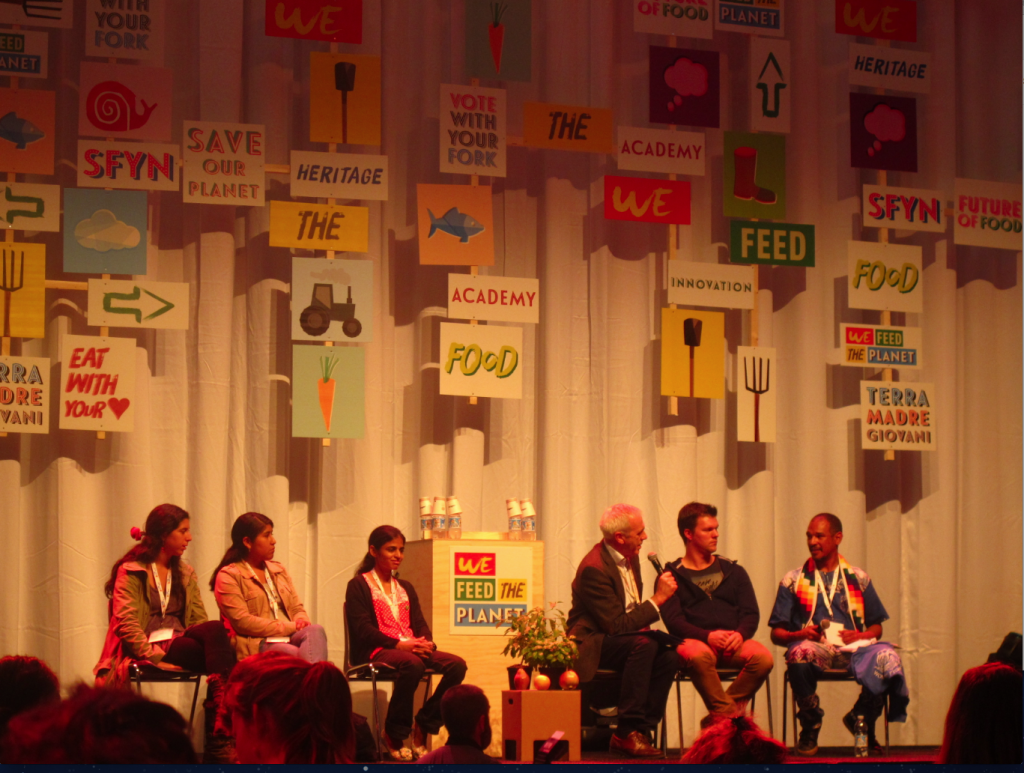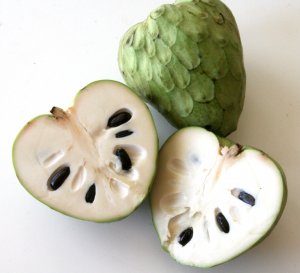You don’t often see farmers or food producers on stage. You definitely never see a Peruvian Cherimoya farmer, a South African fisherman, a Sri Lankan rice grower and a Dutch pig farmer together on one stage.
The ‘Farmers in the Spotlight’ session on the third day of We Feed The Planet powerfully showed the importance and the uniqueness of this gathering of more than 2000 young food producers, food processors and food professionals from all corners of the world.
Meet the farmers:
Christian John Adams is a widely-smiling fisherman who’s been heavily involved in a long political and legal struggle to get the rights of small-scale fishermen respected in South Africa, confronting the power of multi-national fishing conglomerates. He’s been arrested numerous times.
Fiorela Villaneuva Fuentes from Peru grows more than 150 varieties of the cherimoya fruit from heritage seeds. It is a green, spiky fruit whose flavour sits somewhere between a pear and a fig, allegedly.
Dilani Renuka Chandrarathne is pioneering organic rice growing in Sri Lanka; in response to increasing illness, especially kidney-problems, suffered by people in rural areas due to pollution of waterways with agro-chemicals.
Bas Antonissen has worked with his father to convert the family’s industrial pig farm in the Netherlands to organic over the past years: “We’re still de-growing”.
Patrick Holden from the Sustainable Food Trust moderated the session with empathy and insight. Since he himself became a farmer during the back-to-the-land wave of English urbanites in the seventies, he’s been interested in the potential and the challenges for young people to create livelihoods on the land – or at sea.
These four farmers do it first and foremost for the love of it, that’s evidently clear. Fiorela has brought one of her precious cherimoyas on stage. Dilani sees her rice as “a gift of nature” she wishes to share with everyone: “Next time I’ll bring some seeds to you in Italy!”. Bas loves “all the work” on the farm and is happy that he doesn’t have to “specialise, specialise, specialise” as the industrialisation and expansion of the business had increasingly demanded. Also his father is “super-happy”.
Bas recounts how much his father had appreciated a Spanish couple who had recently cycled by, spotted the pigs outside and stopped for a chat. “When we were industrial, no-one would ever come onto the farm to say hi! We’d only get the occasional agri-business sales man.”
When Patrick asks Christian what motivates him to be a fisherman, and scrape together a living, he almost shrugges of the question. “Fishing is not something out there, it’s part of me.” It’s simply not a matter of choice, he needs it to feel connected to the ocean, he says.
While the farmers tell their stories, issues of access and affordability emerge as a running thread.
Dilani’s organic rice is four times more expensive than conventionally-grown rice available on the island because of lower yields (and despite the higher nutrititional value). Only people in the capital Colombo can afford to buy the rice.
Most of the lobsters, barracuda and pike Christian and other small-scale fishermen catch is destined for tourist restaurants or export. Half of their income from the catch goes immediately to the commercial boat owners they rent from.
Bas is also selling his meat mainly to people living in Dutch cities. His meat is four times more expensive than industrial meat. But as Bas put it, “we’re not too expensive, the others are too cheap”. He says most of his costumers decide to eat less but better quality meat for the same money.
Cherimoyas are among the most expensive fruits in Peru. Fiorela sells them at markets in the capital Lima –if she’d sell them locally she wouldn’t be able to make a living. This has been the fate of many small farms in the Andes region, who did not have access to the more lucrative urban markets. Some of these farmers now found employment on Fiorela’s farm.
It seems like, increasingly, whether it’s Sri Lanka or the Netherlands, the rural ‘hinterlands’ are feeding the cities, with good-quality, sustainable and healthy food becoming the privilege of the wealthy or better-of. Still, all four of the producers stress they would prefer to feed their own communities first.
Hearing the four stories brought it home that farmers, both ‘our’ farmers and those in the Global South, should be put in the spotlight much more often – so that we can bear witness to, and act in solidarity with, their common struggles and at the same time get inspired by their passion. They, after all, feed the planet.
The Scottish government has recently launched an open consultation on the future of farming; this is an opportunity to put farmers centre-stage again and create a fairer food system. At We Feed the Planet, we’ve asked farmers from around the world why they farm. Read our blog post about the project and check out #Whatisfarmingfor to hear the farmers’ perspectives and add your own.

